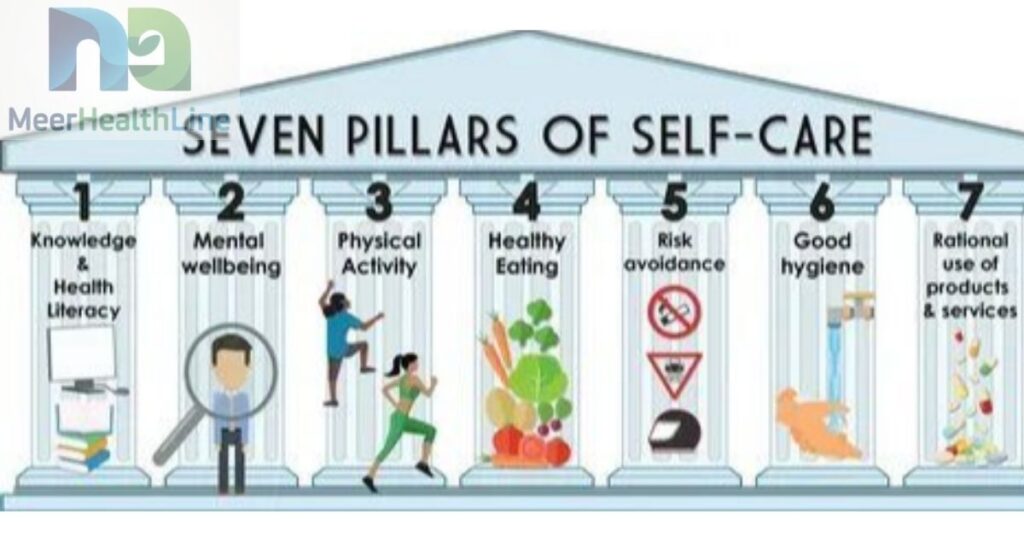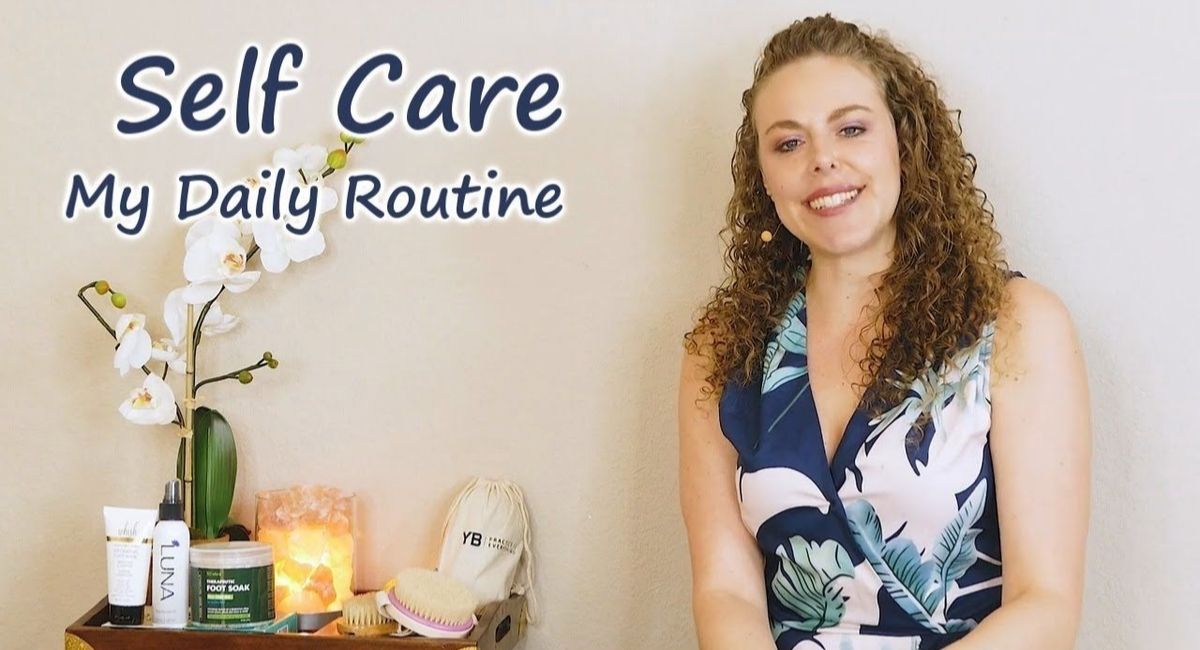Introduction:
The value of self-care is not new to us. In the current stressful life, self-time is not a luxury, but a skill of survival. It can be some whispers of silence in the morning or a sustaining bedtime routine, but deliberate self-care acts to life-changing positive effects on emotional stability, thoughts, and physical health.
Yet, here is the issue: we understand the necessity of self-care, but the majority of us are not able to incorporate it into our everyday routines. We are busy, we are heady, and the sense that we need to put ourselves on the side of the scale probably still sticks with us. Where there is no clear plan and there is no supportive strategy, self-care becomes erratic in nature, and later, self-forgotten.
This is why this guide goes in-depth on the approach to daily self-care routine that is not only doable but also both realistic and sustainable and is adaptable to various needs and lifestyles. You will find out the practical science- and psychology-based steps to make your life more energized, centered, and empowered every day as well, whether you have just begun the self-care journey or want to perfect an existing self-care routine.

1.What is Daily Self-Care Routine?
A daily self-care routine means a routine pattern of rituals that have deliberately been designed to nurture your mental, physical, emotional, and spiritual wellness.
It is not about self-indulgence or getting away; rather, it is about becoming resilient, calm, and energized with small-scale everyday actions that are restorative to your entire being.
Self Care vs. Self Soothing:
- Self-care is preventive (e.g. Physical exercising, restful sleep, boundaries)
- Reactive self-soothing (e.g. watching a TV when stressed)
The rituals of daily self-care do not involve healing burnout; they aim to avoid burnout.
2.Research-based benefits of having a self-care routine every day.
Routine is more than merely comfortable it is neurologically stabilizing. The human brain is happy with structure. This is based on a study conducted by the Academy of Health and in Health Psychology that reported that people who engage in regular regimes of self-care are more satisfied with their lives, and less subject to anxiety.
Neurological Virtues of Habit:
- Decreases the decision fatigue
- Boosts the pre frontal cortex (this is associated with discipline and planning)
- Encourages release of dopamine (reward-motivating chemical)
Physical & Emotional Benefits:
- Better sleeping patterns
- lower levels of cortisol (the stress hormone)
- Improved self awareness and emotional control
This self-care allows you to maintain a good psychological stability in uncertain times, as it anchors you, helping you remain calm and focused and flexible emotionally.

3.The Answer to a Personal Care Routine
a. Evaluate Your Needs Wholesomely
To begin with, look at four self-care pillars:
- Mental –Are you intellectually content or tired?
- Physical-Are you resting and eating and moving right?
- Emotional- feelings/ bottled up?: are you experiencing feelings or sucking them up?
- Spiritual- Do you feel attached to meaning or greater?
Use tools like:
- Self-assessment questionnaires
- Daily mood tracking apps
- Energy audit (What drains you vs. what fuels you?)
b. Make Goals Clear And Purposeful Goals that are too vague
(e.g. I want to feel better) are not effective. SHORT SMART GOALS:
- Specific- 10 mins stretch in the morning
- Measurable – 5 times a week, meditate
- Achievable – Start small; build gradually
- Relevant – Must serve your needs, not trends
- Time-bound – Set daily or weekly checkpoints
c. Develop a Time-Based Self-Care
- Plan In the morning Morning Rituals (Mindset Priming);
- Drink lemon water Journal 3 things you are thankful about
- Sun salutation light stretch
- Imagine what top 3 priorities you will have today
Midday Recharges: (Energy Reset):
- 10 minutes of walk in the outside environment
- Digital detox break
- Deep-breathing (Box breathing: 4444 seconds thoroughness)
- Mindful lunch (no screens)
- Which is a healthy lunch? Evening Wind-Down (Recovery of the nervous system):
- Hot bath mixed up with magnesium salts
- No screen 30 mins before bed Reflective journaling
- What went well today?
- Tea and herbs + relaxing music
Pro tip: To have more energy and restfulness, it is better to align activities with the circadian rhythms.

4.Spa Categories of Self-Care Activities (Deep-Dive)
| Type | Activities | Notes |
| Workouts | Exercise, stretching, nutrition, hydration, rest | Support energy & immunity |
| Mental | Reading, puzzles, planning, focus training | Reduce overwhelm & stimulate growth |
| Emotional | Journaling, therapy, talking with friends | Process feelings, reduce emotional fatigue |
| Spiritual | Prayer, meditation, volunteering, nature walks | Cultivate peace and connection |
| Social | Connecting, setting boundaries, quality time | Fulfill belonging needs & improve mood |
| Sensory | Aromatherapy, music, art, cozy textures | Soothe the nervous system |
Select at least one activity per pillar every day to have a healthy routine.

5.Self-Care Supporting Tools, Apps & Resources
Apps You Have to Try:
- Insight Timer – Meditation and affirmations
- Daylio – Mood & habit tracking
- Finch – Interactive mental health self-care pet
- Tide – Focus and sleep soundscapes
- Notion – Custom habit templates & dashboards
Printable Resources:
- Self-care checklists
- Weekly planners
- Gratitude and mood tracking journals
Embrace tech as an assistant and not a substitute to your self-compassion.
6.Possible Traps to Evade (and Amend) Mistake
| Mistake | Why It Happens | What to Do |
| Over-scheduling | Trying to do too much too soon | Start with 1 habit per day |
| Inconsistency | Life interruptions | Use habit-stacking and alarms |
| Guilt | Feeling selfish | Reframe: “I care for others better when I’m well” |
| All-or-nothing thinking | Missing one day feels like failure | Accept imperfection. Every day |

7.Self-care Template of various lifestyles
Professionals:
AM: Quick mindfulness + protein smoothie
PM: 10-min yoga + brain dumping journal
Parents:
- AM: Music and movement with kids
- Midday: 10 mins alone time during nap or school
- PM: Gratitude journaling or walk post-dinner
Students:
- AM: Set top 3 priorities
- Afternoon: Nature or music break
- PM: Reading or emotional check-in
Create your own template according to time slot: morning, midday, evening…

8.The Best Way to Keep a Daily Personal Care Routine
Going Designing a self-care regimen is half the battle, to adhere to said routine and have it become a habit (and a new lifestyle) is where the main work (and magic) takes place. Life becomes demanding, the will is different many times, and there are distractions all around. However, the proper planning will help you make your self-care practice seamless, enjoyable, and flexible to think twice about it, as brushing your teeth.
These are some of the science-based powerful ways to ensure the application of effective strategies so that you can stick with and develop a self-care habit:
8.1.The Power of Habit-Stacking
Habit-stacking refers to the combination of a new habit to an existing one that you have already formed unconsciously.
Mechanism of action:
- Point out one habit that you perform every day (e.g. brushing teeth, making coffee).
- Directly following the self-care habit, stack on top of it, the self-care habit.
Example:
- Once I have brushed my teeth, I will engage in 3 minutes of deep breathing.
- One activity that I will do after making my morning cups of coffee is to write one thing that I feel grateful about.
It is based on using your own brain habits as anchors -and thus is easier to remember and act upon.
8.2. Goal- planning and Create Momentum Set Micro-Goals
We cannot be consistent as we set our ambitions too high too soon. Large routines or routines that take time are very overwhelming, especially on a low-energy day to start with.
✅ Strategy:
- Minimize the habit to the least unit possible or even 2 minutes.
- Apply identity-based instead of outcome based goals.
Examples:
- Rather than: I will spend 30 minutes a day meditating, say: I am the person who practices 3 conscious inhales each morning.
When you effect this identity in yourself day by day (how little soever), your incentive accumulates.
8.3. Plan an Environment Which Permits Your Routine
The surrounding either helps or destroys your self-care.
Habit proof your surroundings:
- Have a yoga mat on the floor at your room.
- Put a journal by your toothbrush.
- Put relaxing aromatherapy in your self-care area.
- During self-care hours block socially available applications.
The action in your brain can already be sparked by a mere visual signal.
8.4. Reminder and Ritual Cues
The majority of human beings are used to relying on will power, it is not a life-long ally. In place of it, develop ritual triggers and tech hints:
- Block it in your calendar (the time for your self-care) (book it as a meeting)
- Apps that remind (such as Daylio, Loop or Habitica)
- Make a habit (e.g. light the candle = time to journal)
These cues will lead to mental and physical self-care mode after a period of time.
8.5Cultivate Responsibility and Group Incentive
By sharing your self-care journey, you are likely to be more consistent by 65 percent (source: American Society of Training & Development).
Ideas:
- Start a challenge related to self-care with friends
- Use a buddy system – check daily Post achievements over social media
- Download a free habit-tracking application (such as Habit Share)
You get an extra push when you are watched or cheered by someone.
8. 6. Motivate Yourself with Smaller Achievements
When your brain gets rewarded (however insignificant) it releases dopamine (motivation hormone). This is why when you celebrate your success, you reinforce the habit loop.
Self-Reward examples:
- Seven days of consistency → indulge in a good book, a warm bath or a treat
- Represent an example of progress using a tracker or sticker chart
- Write yourself a note: this is great! Self-validation, it starts working!
Make the process good not just the outcome.
8.7. Recognize the goodness of letting go of perfection and getting out of the ballpark of complete or no loss.
Consistency has got its enemy, which is perfectionism. Missing is not giving up, a day is part of the stepping process. It is all about getting back on track.
Motto to be noted:
Discovery over perfection. A little action now is better than nothing.”
In case of missing a day you should only enquire:
- What stood between?
- How can I correct tomorrow?
Be flexible: Routine self-care should empower you, not wear you out.

8.8. Keep Track of Progress, Reflect regularly
Monitoring your activities keeps you alert and inspired. It also enables you to make changes when there is something not working.
Use:
- Bullet journal/ habit tracker
- Electronic programs (Notion, Google Sheets, Trello)
- Weekly reflections:
- So what was good?
- Which aspects were compulsory or exhausting?
Monitoring provides a visual reminder of your progress, which brings confidence and impetus.
Conclusion:
You Deborah Deserve Making a daily self-care routine is not a hack to being more productive, though; it is one way of life that respects your health, your time, and your value. It is not about bringing more to your day, but bringing more meaning and energy into your day. Start small. Reflect often. Things change as you change. With a few minutes a day, you can cultivate a more powerful, centered, stronger, and more resilient you and that is a routine worth attending.
SEO Meta Description
Discover the art of developing self-care routine that will last a lifetime with strength strategies that will support mental, emotional and physical health. Supported by research and psychology of habit.

Welcome to Meer Health line. I am Muhammad Naeem, an AI-Povered SEO, and Content writer with 4 years of experience.
I help website rank higher, grow traffic, and look amazing. My goal is to make SEO and web design simple and effective for everyone.
Let’s achieve more together!

